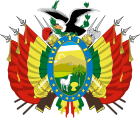This article needs additional citations for verification. (May 2013) |
 |
|---|
|
|
Bolivia's constitution and laws technically guarantee a wide range of human rights, but in practice these rights very often fail to be respected and enforced. “The result of perpetual rights violations by the Bolivian government against its people,” according to the Foundation for Sustainable Development, “has fueled a palpable sense of desperation and anger throughout the country.”[1]
The country's chief human-rights problems, according to a 2010 U.S. State Department report, are “killings and torture by security forces; harsh prison conditions; allegations of arbitrary arrest and detention; an ineffective, overburdened, and corrupt judiciary; a 'partly free' media; corruption and a lack of transparency in the government; trafficking in persons; child labor; forced or coerced labor; and harsh working conditions in the mining sector.”[2] According to human rights watch report the administration of President Evo Morales has created a hostile environment for human rights defenders that undermines their ability to work independently. Threats to judicial independence, violence against women, and child labor are other major concerns.[3] With regard to the report of The Economist dated December 1, 2017, in February 2016 Bolivia's left-wing president, Evo Morales, asked voters through a referendum whether he should be allowed to run for a fourth term in office in 2019. They said no. But on November 28 this year the country's constitutional court gave him what the voters would not, ruling that a clause in the constitution limiting presidents (and other directly elected officials) to two terms can be ignored.[4]
A 2001 report by the UN Committee against Torture praised new legislation and other efforts by the Bolivian government to improve human rights; but the report also expressed concern about the “continuing complaints of torture and other cruel, inhuman or degrading treatment, resulting on many occasions in death, both in police stations and in prisons and military barracks”; the “impunity accorded to human rights violations...resulting from the lack of any investigation of complaints and the slow pace and inadequacy of such investigations”; the lack of enforcement of laws setting maximum detention periods; prison conditions; the sometimes deadly “disciplinary measures” inflicted on soldiers; the “excessive and disproportionate use of force and firearms by the National Police and the armed forces in suppressing mass demonstrations”; the harassment of human-rights activists; and the return to Peru of refugees “without complying with procedural formalities.”[5]
- ^ "Human Rights Issues in Bolivia". The Foundation for Sustainable Deployment. Retrieved January 17, 2013.
- ^ "2010 Human Rights Report: Bolivia". US Department of State. Retrieved January 17, 2013.
- ^ Bolivia
- ^ Evo Morales finds a way to run for re-election
- ^ paras.89-98.En?Opendocument "Concluding observations of the Committee against Torture : Bolivia". Office of the High Commissioner for Human Rights. Retrieved January 17, 2013.
{{cite web}}: Check|url=value (help)
© MMXXIII Rich X Search. We shall prevail. All rights reserved. Rich X Search
